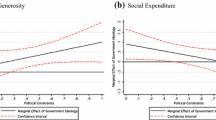Abstract
Augmenting existing models studying incentives to reform labor market, we model labor unions not only as wage setters but also as lobbyists. Acting as interest groups they seek to push governments toward policies that are advantageous to their members. We find that as labor unions can more easily influence governments’ policy decisions, fewer labor market reforms will be implemented, which in turn raises unemployment and inflation, while leaving real wages unaffected. We identify the enlargement of the monetary union and lobbying labor unions as policy complementarities. Furthermore we show that intermediate values of conservatism in monetary policy making of the common central bank yield the worst welfare results for society. Finally, we argue that enlargement may lead to more lobbying.
Access this chapter
Tax calculation will be finalised at checkout
Purchases are for personal use only
Preview
Unable to display preview. Download preview PDF.
Similar content being viewed by others
References
Agell, J. (2002), ‘On the Determinants of Labour Market Institutions: Rent Seeking vs. Social Insurance’, German Economic Review 3: 107–135.
Alesina, A. and G. Tabellini (1987), ‘Rules and Discretion with Noncoordinated Monetary and Fiscal Policies’, Economic Inquiry 25: 619–630.
Barro, R. and D. Gordon (1983), ‘Rules, Discretion and Reputation in a Model of Monetary Policy’, Journal of Monetary Economics 12: 101–121.
Beetsma, R. and A. Bovenberg (1998), ‘Monetary Union without Fiscal Coordination may Discipline Policymakers’, Journal of International Economics 45: 239–258.
Belot, M. and J. van Ours (2001), ‘Does the Recent Success of Some OECD Countires in Lowering Their Unemployment Rate Lie in the Clever Design of Their Economic Reforms?’, mimeo.
Blanchard, O. and J. Wolfers (2000), ‘The Role of Shocks and Institutions in the Rise of European Unemployment: The Aggregate Evidence’, The Economic Journal 110: C1 - C33.
Boeri, T., A. Brugiavini, L. Calmfors, A. Booth, M. Burda, M. Checchi, B. Ebbinghaus, R. Freeman, P. Garibaldi, B. Holmlund, R. Naylor, M. Schludi, T. Verdier and J. Visser (2001), The Future of Collective Bargaining in Europe. Oxford: Oxford University Press.
Calmfors, L. (2001), ‘Unemployment, Labor Market Reform, and Monetary Union’, Journal of Labor Economics 19: 265–289.
Checchi, D. and C. Lucifora (2002), ‘Unions and Labor Market Institutions in Europe’, Economic Policy 17: 363–408.
Elmeskov, J., J. Martin and S. Scarpetta (1998), ‘Key Lessons for Labour Market Reforms: Evidence from OECD Countries’, Swedish Economic Policy Review 5: 205–252.
Grossman, G. and E. Helpman (2001), Special Interest Politics. Cambridge: The MIT Press.
Guzzo, V. and A. Velasco (2002), ‘Revisiting the Case for a Populist Central Banker: A Comment’, European Economic Review 46: 613–621.
Hall, P. and D. Soskice (2001), ‘An Introduction to Varieties of Capitalism’, in P. Hall and D. Soskice (eds.), Variaties of Capitalism, The Institutional Foundations of Comparative Advantage. Oxford, New York: Oxford University Press, pp. 1–68.
Hefeker, C. (2000), ‘Labor market rigidities and EMU’, Discussion Paper, University of Basel, February 2000.
Jacobsen, R. (2000), ‘Why the ECB Should be Ultra-Liberal’, Working Paper No. 2000–10, Department of Economics, University of Aarhus.
Jerger, J. (2002), ‘How Strong is the Case for a Populist Central Banker? A Note’, European Economic Review 46: 623–632.
Liebert, U. (1997), ‘Parliamentary Lobby Regimes’, in H. Döring (ed.), Parliaments and Majority in Western Europe. Campus Verlag/St. Martin’s Press, pp. 407–447.
Lippi, F. (2002), ‘Revisiting the Case for a Populist Central Banker’, European Economic Review 46: 601–612.
Neugart, M. and B. Rother (2002), ‘A Remedy for Fiscal Externalities in a Monetary Union’, Jahrbuch für Handlungs-und Entscheidungstheorie 2, 91–111.
Nickell, S. (1997), ‘Unemployment and Labor Market Rigidities: Europe versus North America’, Journal of Economic Perspectives 11: 55–74.
Nickell, S. and R. Layard (1999), ‘Labour Market Institutions and Economic Performance’, in O. Ashenfelter and D. Card (eds.), Handbook of Labour Economics, vol. 3C. Amsterdam: Elsevier Science, pp. 3029–3084.
Orszag, J. and D. Snower (1998), ‘Anatomy of Policy Complementarities’, Swedish Economic Policy Review 5: 303–343.
Rogoff, K. (1985), ‘The Optimal Degree of Commitment to an Intermediate Monetary Target’, Quarterly Journal of Economics: 1169–1189.
Sibert, A. and A. Sutherland (1997), ‘Monetary Regimes and Labour Market Reform’, CEPR Discussion Paper No. 1731.
Siebert, H. (1997), ‘Labor Market Rigidities: At the Root of Unemployment in Europe’, Journal of Economic Perspectives 11, 37–54.
Author information
Authors and Affiliations
Editor information
Editors and Affiliations
Rights and permissions
Copyright information
© 2003 Springer Science+Business Media Dordrecht
About this chapter
Cite this chapter
Neugart, M. (2003). Interest Groups, Enlargement of the EMU and Labor Market Reform. In: Franzese, R., Mooslechner, P., Schürz, M. (eds) Institutional Conflicts and Complementarities. Springer, Boston, MA. https://doi.org/10.1007/978-1-4757-4062-2_7
Download citation
DOI: https://doi.org/10.1007/978-1-4757-4062-2_7
Publisher Name: Springer, Boston, MA
Print ISBN: 978-1-4419-5380-3
Online ISBN: 978-1-4757-4062-2
eBook Packages: Springer Book Archive




